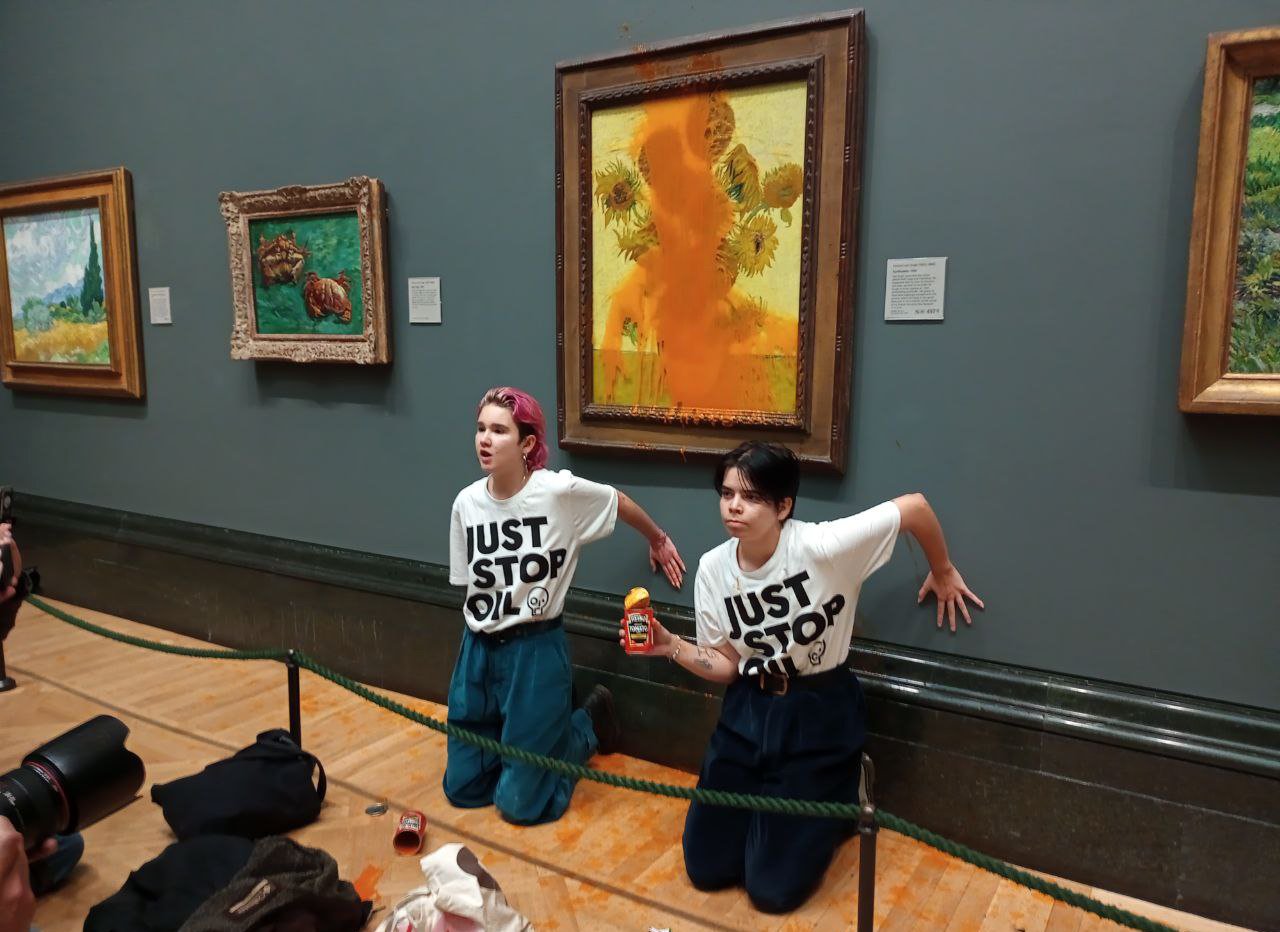
The protest tactic of attacking artworks in museums is highly controversial and poses a threat to public collections, but how should it be handled by the law? As two Just Stop Oil (JSO) activists who threw soup at Van Gogh’s Sunflowers at the National Gallery in London were sentenced to jail in a London court today, over 100 artists and arts professionals have spoken out in defense of their gesture.
Phoebe Plummer, 23, and Anna Holland, 22, have been jailed at Southwark Crown Court for two years and 20 months respectively after being convicted of criminal activity when they threw tomato soup over the the iconic painting in 2022.
The painting, currently on view in the National Gallery’s exhibition, “Van Gogh: Poets and Lovers,” was completed in 1888 and is worth up to £72.5 million ($97 million). It was protected by a glass cover, but prosecutors alleged that the soup acted as “paint stripper” to its 17th-century frame and may have caused up to £10,000 ($13,000) worth of damage. The activists denied damaging the property.
Yesterday, an open letter was published in the protesters’ defense, arguing that the demonstration was itself a legitimate work of art. In a letter published by Greenpeace, the authors claimed: “These activists should not receive custodial sentences for an act that connects entirely to the artistic canon.” They described the flung soup as “a Pollock-esque splatter across the mustard yellow, drooping blooms” and “a sight to behold.”
Art can be, and frequently is, “iconoclasm,” the letter’s authors said, referring to various avant-garde practices that saw artists amend or destroy another artist’s work. In the 1950s, for example, Robert Rauschenberg erased a drawing by Willem de Kooning and, half a century later, Jake and Dinos Chapman “rectified” rare prints of Goya’s Disasters of War. Some of these destructive interventions are now “venerated in museums around the world.”
Just Stop Oil activists Anna Holland arriving at Southwark Crown Court, south London on Friday September 27, 2024, for sentencing after being found guilty of criminal damage for throwing tinned soup over Vincent van Gogh’s Sunflowers at the National Gallery in 2022. Photo: James Manning/ PA Images via Getty Images.
Fiona Banner, Peter Kennard, and Tania Bruguera were among the visual artists to put their name to the letter. Other signatories included musicians, actors, fashion designers, curators, and academics.
In July, Holland and Plummer were found guilty of criminal damage for flinging Heinz tomato soup at the Sunflowers in October 2022. During the trial, they denied that they considered potential damage to the frame and told the court that they believed the painting would be protected by the glass cover.
Judge Christopher Hehir of Southwark Crown Court warned that they should be “prepared in practical and emotional terms to go to prison.”
Also in July, five Just Stop Oil activists were handed jail sentences ranging from four to five years for conspiracy to cause public nuisance when they tried to recruit volunteers to take part in a large scale protest on the M25 in November 2022. These sentences are believed to be the longest ever for non-violent protest in U.K. history.
Vincent Van Gogh, Sunflowers (1888) at the National Gallery, London. Photo by VCG Wilson/Corbis via Getty Images.
The authors of the recent open letter said the Just Stop Oil action “will inevitably enrich the story and social meaning of Sunflowers; and will be remembered, discussed and valued in itself as a creative and incisive work.”
The painting apparently held significance for the activists. Speaking to Frieze shortly after the incident in 2022, Plummer said they decided to target Sunflowers because “Van Gogh said, ‘What would life be if we had no courage to attempt anything?’ I’d like to think Van Gogh would be one of those people who knows we need to step up into civil disobedience and non-violent direct action.”
In their closing statements at court, Plummer said, “I don’t think that action like this fits the black and white letter of the law. Sometimes morality is different from the law, different from justice, different from legal directions,” according to the Times. “The frame was not damaged enough to warrant further restoration. It is still deemed worthy to encase a precious, priceless work of art. I intended to shine a light on the climate crisis and on the cost of living crisis.”
Update: The sentencing has provoked a counter-protest by Just Stop Oil. Just hours after the news broke, three activists entered the recently opened “Van Gogh: Poets and Lovers” exhibition at the National Gallery and threw Heinz vegetable soup over two Sunflowers paintings, one of which is the same work that Plummer and Holland had previously targeted. The other is on loan from the Philadelphia Museum of Art.